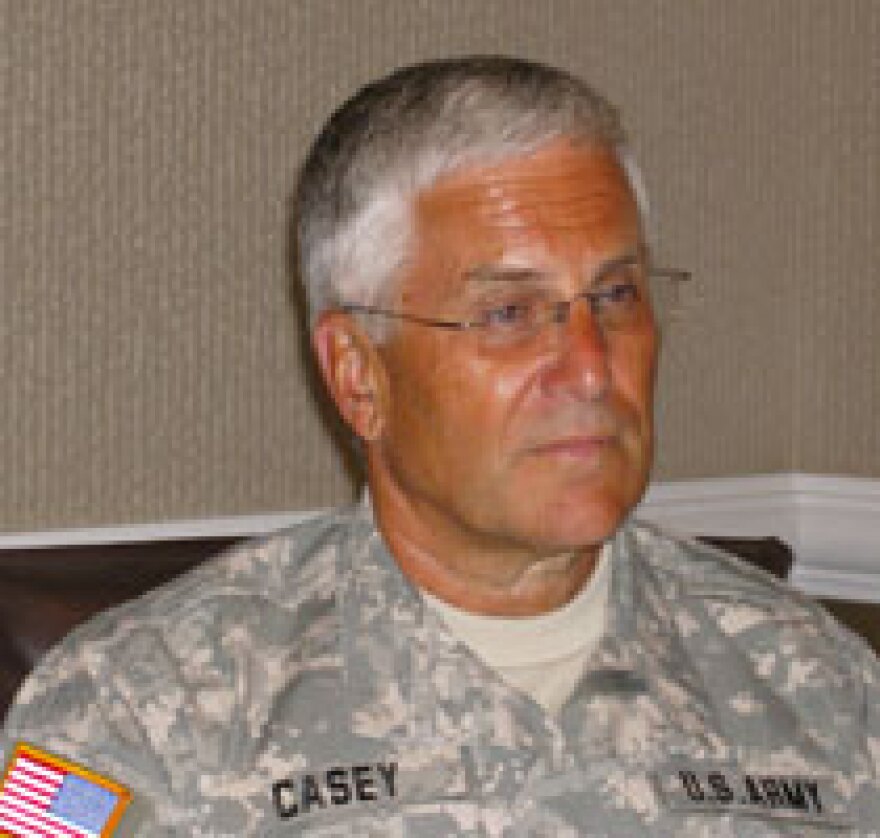http://66.225.205.104/JR20090812.mp3
National Guard and Reserve Soldiers make up half of the soldiers the U.S. Army is deploying to war every year and that pressure is beginning to take its toll. Nearly half of North Carolina's National Guard soldiers are currently deployed to Iraq for a second time in five years. During a visit to the World Affairs Council in Charlotte Tuesday, the Army's Chief of Staff General George Casey laid out his plan to reduce the strain of frequent deployments on soldiers and their families. WFAE's Julie Rose reports: Talk to the spouse of a North Carolina National Guard soldier right now and you can sense the weariness. Michelle Lisk's husband deployed for a year and a half with the 30th Heavy Brigade Combat team back in 2004. And like more than 4,000 other National Guard soldiers, he's in Iraq again. "Some days I'm like 'Man I wish he would get out, I'm tired of this. I've had it.' And then other days I'm like 'You know what? Piece of cake. Another month down and just keep going.' You just have those days sometimes where you say I wish you would get out now come home, I've had it I'm not doing this anymore." The stress of long and frequent deployments on the families of National Guard soldiers is a big concern to General George Casey. He says the Army could not do what it's doing without the contribution of the Guard and Reserves. And yet, "this is the longest we have been at war with a volunteer force," says General Casey. "And so we are a bit on uncharted territory." But the Guard and Reserves are different from full-time army soldiers because they do not live on base and often do not have access to the support and benefits they need to deal with full-time deployments. Has the U.S. Army laid too much of the burden of this war on National Guard soldiers and their families? "That's an interesting question and I think you'd have to ask them," says General Casey. "And when I ask them, what they tell me is you know, first 'You get us to one year out, four or five years back, we think we can keep doing that for awhile.' I don't think there's any question that like the active force, over the last five years we have both been deploying at rates that aren't sustainable for the long haul." By 2011, General Casey wants deployments shrunk from the current 15 months to one year. He says full-time Army soldiers should have 2 years at home between deployments. Guard and reservists would get 3 or 4 years at home. And General Casey says the Army needs to get into a more predicable cycle of deployment so families and soldiers are better prepared to deal with the separation. Dealing with the stress of combat and deployments is General Casey's other priority. "In the military most folks have been in units where there's been a suicide and we can all remember sitting there after the fact and saying 'Gosh I should have known. I wish I'd done something,'" says General Casey. "And I looked at our programs and they were all focused on helping people after we identified there was a problem. And not on giving them the skills they need to not have a problem to begin with." Suicide rates are at record levels since the Army began keeping track. General Casey says there were 140 suicides across the Army last year and in many cases, soldiers have been reluctant to seek or accept help. This October, the Army will launch a program to teach soldiers how to deal with combat stress before, during and after deployment. "The whole idea of the program is to raise mental fitness to the same level as physical fitness," says General Casey. "So just like you talk about the number of pushups you can do, you can talk about the skills that allow you to be more resilient. And that is intended to reduce stigma. General Casey says the program includes an online tutorial because many guard and reserve soldiers living in rural areas don't have access to mental health professionals. But General Casey's emphasis on restoring balance to the Army and offering more to soldiers and their families, carries a sobering message at its core: He expects to be deploying soldiers in the current struggle for at least another decade in what he calls a "long-term ideological struggle."

